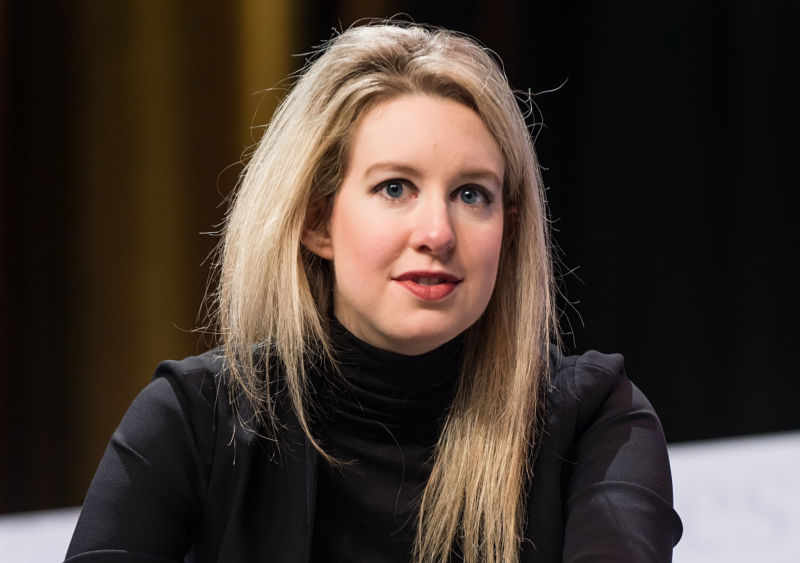

Holmes used fake pharma reports to sell Theranos tech to Walgreens, prosecution...
source link: https://arstechnica.com/tech-policy/2021/10/to-hook-walgreens-holmes-gave-execs-fake-pharma-reports-prosecution-says/
Go to the source link to view the article. You can view the picture content, updated content and better typesetting reading experience. If the link is broken, please click the button below to view the snapshot at that time.

Theranos trials —
Holmes used fake pharma reports to sell Theranos tech to Walgreens, prosecution says
Walgreens thought “the technology worked as we were told.”
Tim De Chant - 10/14/2021, 3:31 PM

Theranos founder Elizabeth Holmes gave Walgreens executives fake reports from major pharmaceutical companies to lend credibility to her company's ill-fated blood diagnostic devices.
The bombshell came during the prosecution’s questioning of former Walgreens CFO Wade Miquelon. Holmes is on trial for 10 counts of wire fraud and two counts of conspiracy to commit wire fraud. Partly on the strength of those reports, Walgreens would go on to make a $140 million deal with Holmes’ startup $100 million as an “innovation fee,” and $40 million as convertible notes that could be converted into equity.
“Our common understanding was the technology worked as we were told,” Miquelon told jurors. He said his company had also spoken with doctors and other experts at Johns Hopkins who said Theranos’ technology was sound and would be useful in clinics like the kind Walgreens envisioned. However, Walgreens executives weren't able to validate the device first-hand—Theranos took it back before they had the chance.On cross-examination, Miquelon said Walgreens had hired an external lab to review Theranos’ results but not the machine itself. “They were interpreting data they were given as opposed to taking the machine apart, if you will,” he said.
“Lead pony”
Holmes was in talks with both Walgreens and Safeway in 2010. Earlier, the jury heard testimony from Safeway’s former CEO, Steven Burd, who thought Theranos’ technology “was a fascinating concept” and described Holmes as charismatic, smart, and decisive.
Miquelon was similarly upbeat about Theranos. “This was one of the most exciting companies that we had seen, maybe not just in lab but in general,” Miquelon said. In a March 2010 email to Greg Wasson, who was Walgreens’ CEO at the time, Miquelon wrote that they “may have found the lead pony” among companies that offer diagnostic tests where patients receive care.Holmes told Walgreens executives that three pharmaceutical companies—including Pfizer and Schering-Plough—had performed due diligence on her company’s blood-testing technology. She convinced them that vetting by those and other companies and experts was enough to move ahead with a partnership. Holmes dropped names, too, mentioning that Oracle co-founder Larry Ellison had endorsed the company's tech, Miquelon said.
AdvertisementBut the reports from both Pfizer and Schering-Plough were faked, prosecutors said. The report from the latter company even contained a typo—“Schering Plough Research Institure,” misspelling the word "institute"—a detail Miquelon told jurors he had missed.
Holmes also told Walgreens executives that Theranos' proprietary Edison devices could perform nearly all conventional lab tests in just 15–20 minutes. “My understanding is [that] the blood would be tested on the Edison device,” Miquelon told the court. “My understanding was that the base-level testing would be able to do 96 percent of the testing done at labs.”
Souring relationship
Walgreens agreed to a deal in 2010, Miquelon said, with the right to terminate at the end of the year if Theranos didn’t receive approval from the Food and Drug Administration. The startup didn't get approval, but Walgreens didn’t end things. Instead, it moved forward with “Project Beta” in 2010 and “Project Normandy” in 2012, working through specifics and hammering out regulatory questions. There was a question, for example, about whether each Walgreens lab would need to be regulated or whether Theranos’ main lab would cover all the devices. “Due to the new-to-the world nature of the technology, it required some work to understand,” Miquelon said.In August 2013, just before Walgreens was scheduled to launch Theranos testing in 40 stores across Arizona and California, Holmes asked the drug store company to advance the startup part of the agreed-upon $100 million “innovation fee.”
Over the next year, Walgreens' relationship with Theranos soured. The blood-testing startup ended up voiding tens of thousands of test results after regulators began probing the company. In 2016, Walgreens sued Theranos for $140 million before ultimately settling for $25 million.
Recommend
About Joyk
Aggregate valuable and interesting links.
Joyk means Joy of geeK